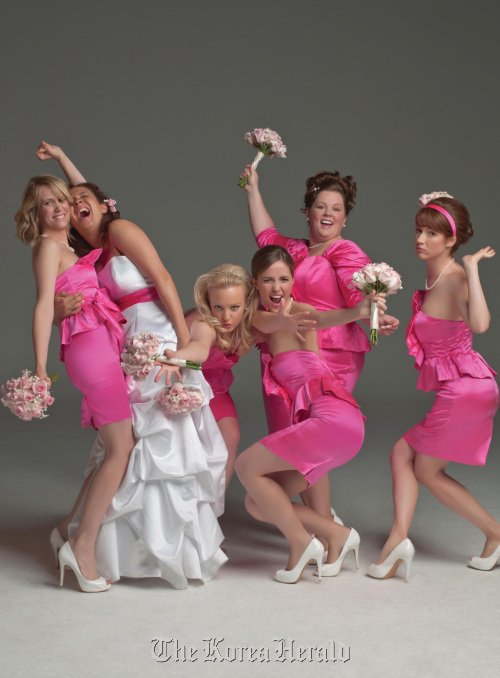Fewer women making R-rated comedies than 15-20 years ago
In corporate America, it’s no longer a surprise to see a woman running a giant company like eBay or Hewlett-Packard. But in Hollywood, where actresses have far shorter careers than actors do, and male stars are paid far more than leading ladies, there are still mountains to climb. That’s especially true in the comedy world, which is dominated by actors such as Adam Sandler, Seth Rogen and Jack Black, men in various stages of arrested development whose films view women, with rare exception, as sex objects and helpmates.
So it was quite a shock to see that the highest-grossing new film in its opening weekend was “Bridesmaids,” a raucous romp starring “Saturday Night Live” comedian Kristen Wiig that my colleague Betsy Sharkey described as “an R-rated romantic comedy from the Venus point of view.”
In corporate America, it’s no longer a surprise to see a woman running a giant company like eBay or Hewlett-Packard. But in Hollywood, where actresses have far shorter careers than actors do, and male stars are paid far more than leading ladies, there are still mountains to climb. That’s especially true in the comedy world, which is dominated by actors such as Adam Sandler, Seth Rogen and Jack Black, men in various stages of arrested development whose films view women, with rare exception, as sex objects and helpmates.
So it was quite a shock to see that the highest-grossing new film in its opening weekend was “Bridesmaids,” a raucous romp starring “Saturday Night Live” comedian Kristen Wiig that my colleague Betsy Sharkey described as “an R-rated romantic comedy from the Venus point of view.”

Co-written by Wiig and Annie Mumolo, “Bridesmaids” has women in all of its major roles. The film is a smash with critics, who gave it a sky-high 89 at Rotten Tomatoes; the tough-minded Manohla Dargis, who normally finds Hollywood comedies beneath contempt, praised the film as “unexpectedly funny,” going “where no typical chick flick does: the gutter.” Even more important, in terms of having an impact in copycat Hollywood, the Universal film has been doing the kind of business that could bust open the doors for more female-oriented raunchy comedy.
There’s just one tiny irritating grain of sand in the film’s Cinderella-style slipper. Despite all that girl power, “Bridesmaids” was, ahem, directed by a guy, Paul Feig. In fact, when it comes to R-rated comedy, female directors are basically out of sight and out of mind. When I asked several top studio executives for the filmmakers who would make their R-rated comedy director’s lists, they rattled off a roster of names ― including Todd Phillips, Greg Mottola, David Wain, Jake Kasdan and David Gordon Green ― all men.
The only woman anyone mentioned was Anne Fletcher, who directed such comic hits as “The Proposal” and “27 Dresses.” But even she was viewed as a borderline choice, since her films are good-natured romantic comedies with barely a nod to the raunch that dominates the R-rated comedy world. (New Line offered her the job of directing its upcoming R-rated comedy “Horrible Bosses,” but she turned it down.)
To make matters worse, you’d have to consider this a huge step backward, since 15 or 20 years ago, there would’ve been more women on the list, namely Betty Thomas, Amy Heckerling and Penelope Spheeris, along with such PG-13-oriented directors as Nora Ephron, Nancy Meyers and Penny Marshall.
Meyers and Ephron are the only ones of the group whose careers aren’t in eclipse ― and they make romantic comedies for baby boomers, not raunchy fare for the young guys who’ve turned R-rated movies like “The Hangover” and “Knocked Up” into financial bonanzas. The last raunchy comedy to be directed by a woman that was a bona-fide hit was “Private Parts,” which Thomas helmed nearly 15 years ago.
So what’s happened? Why didn’t a new generation of female filmmakers come along ― or get an opportunity ― to make its name in R-rated comedies? After talking to a host of industry executives, agents and managers, I’d have to say that the deck is stacked against women, thanks to a complicated set of gender and psychological issues.
The biggest hurdle is gender: Comedy is a man’s world. The big comedy stars and top comedy producers are guys. And comedy directors aren’t artistes, like David Fincher. They are hired hands whose job is to execute the vision of the comic star, which is why a host of comedy directors go way back with their talent, starting out as their roommates, fellow actors or TV show pals.
It takes a top star or a powerful comic producer like Judd Apatow to vouch for these often unqualified directors, assuring studio chiefs that they will deliver the goods. Mike Meyers got the then-unknown Jay Roach his job directing “Austin Powers.” Apatow helped Ben Stiller land his directing gig on “The Cable Guy” when he was a nobody.
By Patrick Goldstein
(Los Angeles Times)
(McClatchy-Tribune Information Services)









![[Kim Seong-kon] Democracy and the future of South Korea](http://res.heraldm.com/phpwas/restmb_idxmake.php?idx=644&simg=/content/image/2024/04/16/20240416050802_0.jpg&u=)







![[KH Explains] Hyundai's full hybrid edge to pay off amid slow transition to pure EVs](http://res.heraldm.com/phpwas/restmb_idxmake.php?idx=652&simg=/content/image/2024/04/18/20240418050645_0.jpg&u=20240418181020)

![[Today’s K-pop] Zico drops snippet of collaboration with Jennie](http://res.heraldm.com/phpwas/restmb_idxmake.php?idx=642&simg=/content/image/2024/04/18/20240418050702_0.jpg&u=)